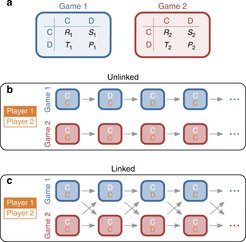Cooperation pays off on multiple levels
Game experiments with multiple channels: Cooperative behaviour is even more beneficial

Game theory examines how people behave in strategic decisive situations. Computer simulations, calculating the development of thousands of consecutive game experiments, can help to discover long term advantages and disadvantages of different strategies. In many decisive situations, there are two main strategies: support your game partner, meaning to cooperate with him/ her, or concentrate on your own present advantage, thus not cooperating. What is more successful in the long run for the individual?
Previous experiments already have shown that cooperation can pay off in the long term: If I cooperate myself, it is much more likely that my game partner will cooperate in the next game, too, which is good for me.
But these research experiments have one weak spot: They always only examine one single game that is repeated very often. This does not seem to be very realistic: People normally take part in various different interactions at the same time. Team members work together in multiple projects, and even whole nations inetract in various numbers of fields like trade, climate change or security.
This is why researchers at the Max-Planck-Institute for Evolutionary Biology, the Cornell University (USA), the Harvard University (USA and the University of Exeter (UK) have developed a new method for these experiments: In their computer simulations the same players take part in different repeated games in parallel, “multi channel games”, thus developing more complex strategies that influence their behaviour in all games in a different manner.
The researchers were able to show that with these more realistic scenarios, cooperative behaviour even pays off more strongly than in the classic simulation settings with single, isolated games. The behaviour in one game can be used to enforce cooperative behaviour in another one. By these connections, cooperation is facilitated in general.
Link to publication: https://www.nature.com/articles/s41467-020-17730-3
